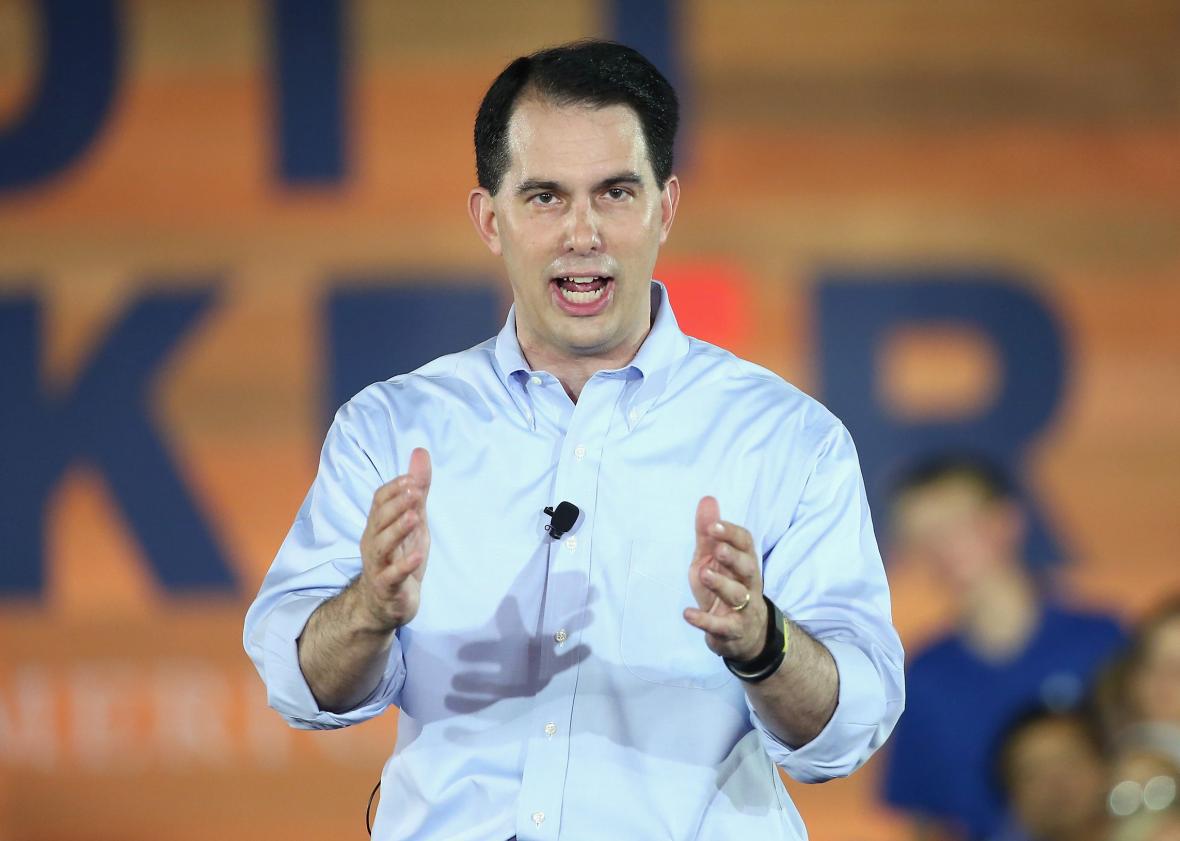WAUKESHA, Wisconsin—Bold was the word of the day at Scott Walker’s formal announcement of his presidential campaign. Repeatedly the word was ladled over the sweltering supporters gathered in a local expo center that took on the close and aromatic aspect of a sweat lodge. Speaker after speaker testified to Walker’s boldness before he walked the runway to his place in the middle of the boisterous crowd. The candidate used the word a couple of times himself.
But when Walker spoke there was nothing terribly bold about what he said. He supports growth, security, and America. He supports a garden-variety Republican platform—repealing Obamacare, building the Keystone Pipeline, removing regulations, and lowering taxes.
Where the candidates announce their candidacies tells you about their campaign. Jeb Bush chose Miami Dade College so that the tableau of diverse faces could speak to his effort to expand the Republican Party. Bush has since talked about the makeup of that crowd and how it doesn’t look like the typical Republican electorate. Walker’s crowd was 99 percent white, and he spoke in Waukesha County, a bright red Republican stronghold. Wisconsin is purple, but Walker has won by making the red parts redder. Unlike Bush, who seeks to be a synthesis candidate reaching out to new constituencies, Walker’s promise to Republicans hungry for a presidential win is that he’ll amp up conservative turnout.
In this modern age of hyperpartisan combat, no one running has consistently succeeded when fighting for conservative principles the way Walker has. Actually fighting and winning conservative fights is what voters are hungry for. That’s why Walker used the word “win” six times.
Walker never mentioned same-sex marriage, and he only quickly referred to abortion, but his pitch had echoes of what you would expect from a culture warrior. He is the one who not only beats liberals, but puts them in their place.
The audience cheered most loudly when he mentioned requiring a photo ID to vote, a concealed-carry handgun law that he had passed, and one establishing the castle doctrine. Those are policy positions, but they are also fault lines with liberals. The crowd wasn’t just rooting for Walker; they were rooting for a vision of America where the advancing liberals are vanquished. In the video montage that played before Walker appeared in his casual-Friday shirtsleeves, liberals like Ed Shultz and Rachel Maddow were shown despondent that Walker had survived the recall election so easily. Walker’s recall was presented not just as a victory for him but the moment “when America, got her voice back,” as one speaker put it.
If there’s one candidate Walker is aiming at with all of his talk of winning, it’s Sen. Ted Cruz. Walker and Cruz are the two best-funded competitors running to be the conservative standard-bearer. Walker’s argument is that while Cruz may talk a good game, he has no concrete accomplishments. Walker made an unmistakable reference to Cruz in his announcement video. “In the Republican field there are some who are good fighters, but they haven’t won those battles,” he says. “There are others who’ve won elections, but haven’t consistently taken on the big fights. We’ve shown you can do both.”
Voters usually make their choices in primary campaigns based on two criteria: whether a candidate has the right ideological positions and whether he can get elected. Usually voters have to give up on one criterion. Walker argues that this time they can have it all.
